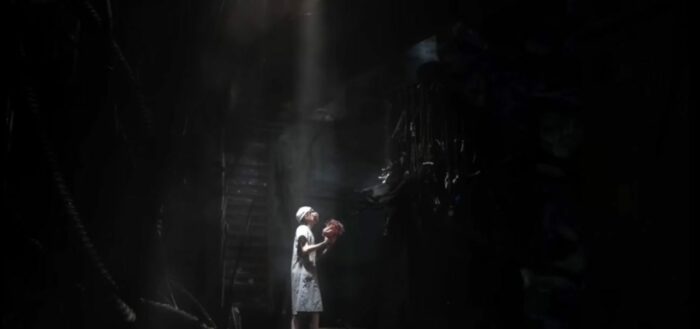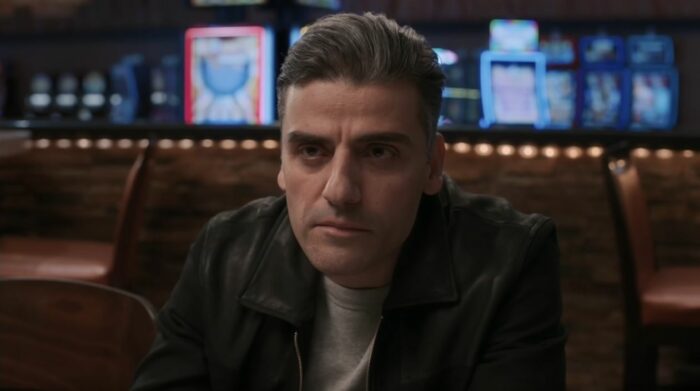Each week we bring you recommendations of things to watch, listen to, play, read, or otherwise consume with your sensory apparatus. This week, Hawk recommends Phil Tippet’s long-awaited Mad God, Caemeron’s been listening to Fugazi on repeat, and Paul thinks you might enjoy The Card Counter.
Film Recommendation: Mad God
Hawk Ripjaw: Phil Tippet, legendary creature designer and animator for Star Wars, Robocop, Jurassic Park, and many more, has finally, finally released the magnum opus he’d almost abandoned. After three decades of waiting, Mad God is finally here, and what a treat it is.
There’s not really much of a traditional narrative structure, as the film is almost completely devoid of any dialogue whatsoever. It’s all storytelling through imagery, with a heavy focus on hell and war and death. The basic gist is a man called The Assassin is sent down to hell in a diving bell with a bomb to destroy it all. And things just generally don’t go very well for him.
Not that we need any more convincing, but Mad God is further proof that Tippet is one of the best in the business. The film is an incredible achievement in stop-motion animation, with intricately designed models fluidly and beautifully animated in complex settings. Not that I’d ever be able to do it myself, but I’ve got a basic understanding of how stop-motion works and the way Tippet animates these things and incorporates so many tiny details and even camera movements is absolutely astonishing. I adore the art form and I hope it gets more of a resurgence soon (although I recognize the titanic amount of work that goes into it).

Also…are we sure Phil is doing all right? This movie is bleak. It’s horrifying, disgusting, and absolutely nightmarish. Slave creatures constantly being churned out by the machine, manufactured from what appears to be the insides of giants being electrocuted literally defecating from the torture, frequently are violently killed by other creatures or machines. A man is torn apart, and some kind of demon baby is crushed, and there are plenty of other grimy, sickening locations, creatures and events that come together into a very distressing 80 minutes. It’s helped by the squishy sound effects and discordant music, which sometimes plays in reverse to accentuate the hellscape.
But it’s also so incredibly fascinating to see it unfold, with so much imagination up on that screen and so much to interpret from every new scene. I could watch this multiple times just to find out what else I can find in the dense collection of visuals here. It’s not even just interpretation, either: the little props and details of the models are going to be a lot of fun to examine and spot what was used to make some of these things come to life, or contemplate how they pulled it off. I know that Tippet almost gave up on Mad God all those years ago, and I’m glad he decided to pick it back up again to finish it. It was worth the wait.
Song of the Week: “Waiting Room” by Fugazi
Caemeron Crain: The phrase “song of the week” might bring to mind something about new singles or what’s hot on the charts right now, and it’s all well and good if others want to take it that way when they highlight things in this space, but I have a different idea, which is maybe sort of weird, but I hope some of you might dig it. This is the song that’s been stuck in my head all week.
I’m sure there are reasons why this week it was “Waiting Room” by Fugazi. In particular the opening line, “I am a patient boy,” which I found rising to the top of my consciousness as I did some particularly tedious tasks. (If you’re curious, this primarily involved cleaning spinach.)
Patience is a strange thing. We talk about running out of it, and I think that’s apt. It’s like a resource—some reserve of energy exerted as a bulwark against a rising tide of frustration. And when that breaks, or the figurative wall of patience has eroded, chaos ensues.
But I am a patient boy, even if I’m less a boy than a man. I wait, I wait, I wait. Take pleasure in the meticulous completion of a project.
Of course, a waiting room is different, but there is a skill involved in waiting effectively. I’m getting pretty far away from the song, I know.
If you’re not familiar, Fugazi’s “Waiting Room” dates from 1988. It was purportedly inspired by the failure of Ian MacKaye’s previous band, Embrace. That’s what Wikipedia says. So it’s always already been more about people than things. A metaphorical waiting room, and of course the waiting room as a symbol resonates with Twin Peaks.
Most importantly, it’s a great song.
Another Film Recommendation: The Card Counter
Paul Keelan: For many, The Card Counter may feel like middle of the pack Schrader. I’m not sure that’s such a bad thing: middling Schrader outsmarts most American filmmakers on their “A” game. Yes, the screenplay may be a little rough around the edges, but it still offers an unflinching and scrupulous examination of a tricky moral quagmire. It also suits Schrader’s signature motifs and sensibilities like a spade—creating a hyper-reflexive character study of a man tortured by invisible contrition.
Oscar Isaac (William Tell) is smooth and subtle throughout—selling every monotone monologue with an inscrutable poker face. Like a true card-playing maestro, he perennially oozes stoicism—suppressing a life of regrets and poor decisions with phlegmatic poise. Tye Sheridan (Cirk) stealthily puts in a charismatic performance of his own. His role is much lower stakes—eerily evocative of his idiosyncratic work in Rick Alverson’s The Mountain and Entertainment. The ease in which exudes a well of emotion while playing laconic/naïve characters is quite beguiling—his recent roles may seem banal, but a deeper study will yield complex psychological dynamics. My sole disappointment was Tiffany Haddish (La Linda). She’s refreshingly playing against type, but some of her line readings seemed stilted and ungainly.

The Card Counter is at its best when capturing the quotidian nature of professional gambling. The semi-pro poker tournaments are believably drab. Schrader painstakingly recreates the depressing, quasi-somnambulant ambiance of gambling venues. The card/casino games are also explained concisely and clearly—with William Tell’s narration providing brief tutorials on roulette wheel percentages, Texas Hold ‘Em techniques, and the art of card counting. Nevertheless, the film’s primary suspense and enigma comes from Tell’s mysterious background. The real questions are existential/psychological—we care more about why he’s devoted himself to gambling and fostering a strange kid (Cirk) than whether he succeeds.
Slowly, motives crystallize as backstories of incarceration and wartime indiscretions come to light. The backdrop of harrowing war prisons gives hints into why Tell seems to enjoy the strict rigmarole and cheerless atmospherics of the casino. Casinos provide a world of hermetic routine and predictable uncertainty—a world where everything is sterile, regulated, homogenous and repetitive. Schrader captures these qualities exquisitely. You can sense the mundaneness, the sameness in every scene. You can smell the chlorine in the motel pools. You can taste the bitter coffee at the frumpy roadside cafes. You can feel the plastic tactility of the cheap poker chips. You can hear the nauseating din of slot machines. You can see the gaudy flicker of fluorescent redundancy.
The film accentuates these qualities to reveal an unspoken ideology—to defend the (a)moral and (a)political neutrality of its protagonist. And as if following the lead of its ill-fated protagonist, The Card Counter chooses to mechanically retreat to familiar territory as well—opting for the repose and sense of superiority engendered by self-imposed solitary confinement. It’s a daring, subversive proposition—redefining prison as a space of catharsis, and repetition as spiritual escape.
The Card Counter is now streaming on HBO Max.


